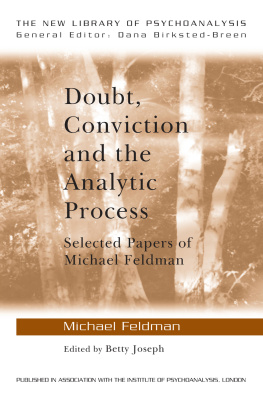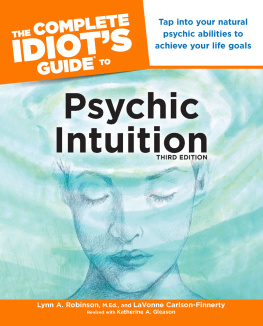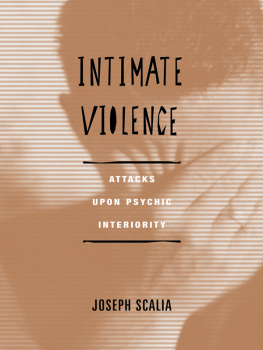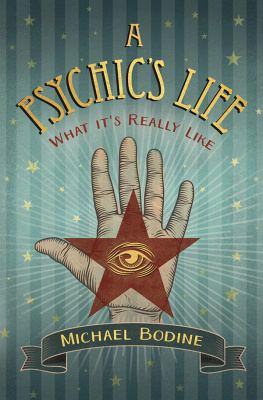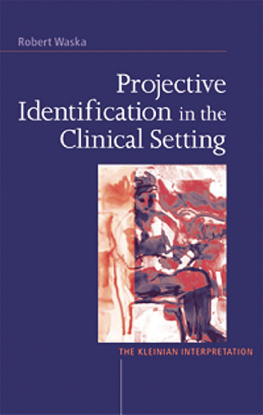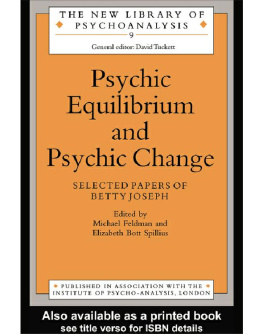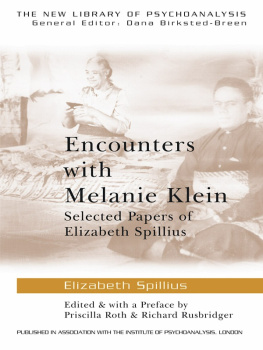Contents
Page List

THE NEW LIBRARY OF PSYCHOANALYSIS
General Editor Dana Birksted-Breen
The New Library of Psychoanalysis was launched in 1987 in association with the Institute of Psychoanalysis, London. It took over from the International Psychoanalytical Library, which published many of the early translations of the works of Freud and the writings of most of the leading British and continental psychoanalysts.
The purpose of the New Library of Psychoanalysis is to facilitate a greater and more widespread appreciation of psychoanalysis and to provide a forum for increasing mutual understanding between psychoanalysts and those working in other disciplines such as the social sciences, medicine, philosophy, history, linguistics, literature and the arts. It aims to represent dliierent trends both in British psychoanalysis and in psychoanalysis generally. The New Library of Psychoanalysis is well placed to make available to the English-speaking world psychoanalytic writings from other European countries and to increase the interchange of ideas between British and American psychoanalysts.
The Institute, together with the British Psycho-Analytical Society, runs a low-fee psychoanalytic clinic, organizes lectures and scientific events concerned with psychoanalysis and publishes the International Journal of Psychoanalysis. It also runs the only UK training course in psychoanalysis that leads to membership of the International Psychoanalytical Association the body that preserves internationally agreed standards of training, of professional entry and of professional ethics and practice for psychoanalysis as initiated and developed by Sigmund Freud. Distinguished members of the Institute have included Michael Balint, Wilfred Bion, Ronald Fairbairn, Anna Freud, Ernest Jones, Melanie Klein, John Rickman and Donald Winnicott.
Previous General Editors include DavidTuckett, Elizabeth Spillius and Susan Budd. Previous and current Members of the Advisory Board include Christopher Bollas, Ronald Britton, Donald Campbell, Stephen Grosz, John Keene, Eglb Laufer, Juliet Mitchell, Michael Parsons, Rosine Jozef Perelberg, David Taylor, Mary Target, Catalina Bronstein, Sara Flanders and Richard Rusbridger.
First published 1989 by Routledge
2 Park Square, Milton Park, Abingdon, Oxfordshire
OX14 4RN
711 Third Avenue, New York NY 10017 (8th Floor)
Routledge is an imprint of the Taylor & Francis Group, an Informa business
in the edited collection as a whole and in the introductory matter,
Michael Feldman and Elizabeth Bott Spillius;
in the papers, Betty Joseph
Filmset by Mayhew Typesetting, Bristol, England
All rights reserved. No part of this book may be reprinted or reproduced or utilized in any form or by any electronic, mechanical, or other means, now known or hereafter invented, including photocopying and recording, or in any information storage or retrieval system, without permission in writing from the publishers.
British Library Cataloguing in Publication Data
Joseph, Betty
Psychic equilibrium and psychic change:
Selected papers of Betty Joseph,
(New library of psychoanalysis; 9)
1 Psychoanalysis
I. Title II. Feldman, Michael
III. Spillius, Elizabeth Bott
IV Series
150.195
Library of Congress Cataloging in Publication Data
Joseph, Betty.
Psychic equilibrium and psychic change; selected papers of Betty Joseph / edited by Michael Feldman and Elizabeth Bott Spillius.
p. cm. (New library of psychoanalysis: 9)
Complete list of the published papers of Betty Joseph: p.
Bibliography: p.
Includes index.
1. Psychoanalysis I. Feldman, Michael.
II. Spillius, Elizabeth Bott. 1924
III. Title. IV. Series.
RC504.J67 1989 894407
616.8917 dcl9 CIP
ISBN 9780415041171 (pbk)
NEW LIBRARY OF PSYCHOANALYSIS
General editor: David Tuckett
Psychic Equilibrium and Psychic Change
SELECTED PAPERS OF BETTY JOSEPH
Edited by
MICHAEL FELDMAN and ELIZABETH BOTT SPILLIUS

To the past and present members of my seminarwhich has evolved into a workshopwith whom the ideas in this book were developed
Contents
The strength and vitality of scientific ideas can be judged by their growth and the developments which arise from them. Freuds own ideas changed and developed to the end of his life. They also gave rise to many different, sometimes divergent or even controversial developments, and I do not mean such dissident developments as those of Jung or Adler, but those genuinely based on Freuds own work and his work in various phases of his own development, some followers pursuing more his early work, some the later.
Of those pursuing Freuds later work, Melanie Klein is probably the most significant. Like Freuds, her own work developed, bringing in new ideas and changes of emphasis, till the end of her life. That development continued in the work of her pupils. Her central ideas of the importance of early stages of development and the paramount role of the interplay between unconscious phantasy and reality and that of the shifts between the paranoid-schizoid and depressive positions inform the work of all her pupils. Technically, the importance she attaches to the transference is a constant in their work. On the other hand, they pursued their researches in different directionsfor instance, Bion and Rosenfeld into the analysis of psychotics and her various followers developed different styles of work with different emphases.
One of Kleins late conceptsthat of projective identificationof which she gives only a few lines in her paper Notes on some schizoid mechanisms (1946) generated research which has resulted in rich contributions to both theory and practice. In particular it contributed to the understanding and uses of countertransferencean area unexplored by Klein herself. It was also one of her concepts which has gained world wide acceptance among psychoanalysts of various orientations.
With the group of analysts who particularly investigated the implications of that concept for daily technique and clinical approach to patients, in recent years Betty Josephs work is a particularly important development. It is unspectacular and developed step by step, and it is only slowly that it started to gain increasing importance, particularly among Kleinian analysts, but becoming gradually also more generally accepted not only in Great Britain but also arousing a great deal of interest abroad, including the USA.
I first met Betty Joseph when she came to London as a candidate in 1945, but began to know her only in 1949. She was just qualified, having started her analysis with Balint in Manchester and having followed him to London, After qualification she started an analysis with Paula Heimann, and it was at the time of this transition that she came to me (I was just starting as a training analyst) to discuss some of her cases. It always surprises me that I actually remember one of her patients and a dream he brought. He was a shoe fetishist and was particularly interested in high heels, especially those known as stiletto heels. He dreamed that he threw a knife under a cupboard, and I remember telling her that his picture of the phallic woman was based on his projection of his own penis into her. It says something about the vividness and conviction with which she presented this material that I remember it to this day. I also remember it with affectionate amusement, considering how much I have learned from her about projective identification in later years.


